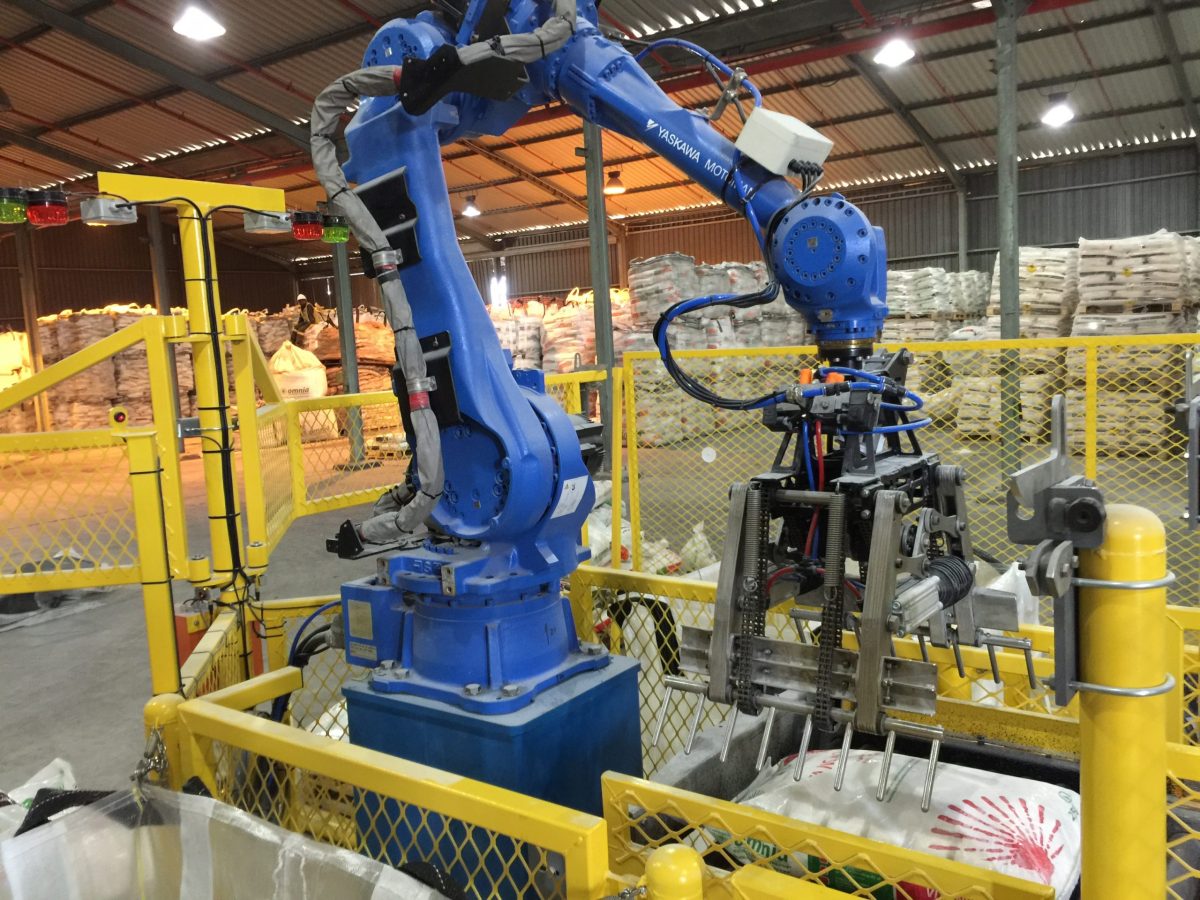
In the ever-expanding demands of industry, robotics has had to flex and adapt to suit new niches. One such niche is the recent trend towards bag-in-bag packaging where products supplied in large bags (typically 50kg) are now being packed into 2-tonne bulk bags instead of palletised onto wooden pallets.
“Developing strong partnerships with companies that are themselves experts in their fields, provides us with the opportunity to provide turn-key solutions that help solve prior difficulties. Compact Robotics is a long-standing partner of Yaskawa Southern Africa specialising in bag handling applications and were therefore the obvious choice to team up with for this challenge,” says Yaskawa Southern Africa’s System Solutions Engineer, Riccardo Ferrari.
Every industry has the three Ds (dirty, dull, and dangerous jobs) that no human wants to do, but these tasks still need to be completed. Thanks to the invention of robotics, though, there’s now the option to automate these functions, freeing up your human workers to focus on more challenging work that requires cognitive reasoning.
Whether you’re lugging around lumpy heaps of fertiliser or loading heavy, dusty bags of cement onto a pallet, bag-handling is a task that’s much better suited for a robot than a human being. In fact, you might be endangering your staff, product, and production line by insisting that it’s done manually.
“From an ergonomic point-of-view, this function poses a serious health risk to workers,” says Compact Robotics Managing Director, Martin Bensch. “Employees who have to carry and palletise the bags themselves endure physical strain due to the heavy weight of the objects and the constant repetition of the job.”
Naturally, they might tire at some point and drop the bag, possibly injuring themselves and/or causing unnecessary wastage of the product. With the global drive for businesses and industries to automate and work smarter (not harder), robotics presents the chance for both innovation and efficiency.
“For companies that decide to automate, the biggest and most notable benefit is the increase in production,” Bensch explains. “Robots are incredibly reliable and efficient, as they provide consistent and accurate performance around the clock. You know exactly what they’re capable of and what’s possible for your production line to achieve.”
Taking away the guesswork is something that every business can get behind, especially in a time when forecasts and data-driven decisions are more critical than ever. Equally important is the fact that robots hold the key to solving challenges traditionally seen as unsolvable.
As an example, Bensch explains how Compact Robotics and Yaskawa developed a unique solution for a problem that a local fertiliser company experienced.
“In the fertiliser industry, fertiliser gets packed into a 2-tonne bulk bag, not on pallets,” says Bensch. “To get the fertiliser into the bulk bag, though, an employee was required to pick up a 50-kilogram bag, balance it on their head, then drop it into the bulk bag. For obvious reasons, this was a dangerous exercise and not a viable way to do it.”
While a robot with a gripper was identified as the answer, there was another challenge: the gripper couldn’t release properly due to the size of the bulk bag. A tailormade solution had to be developed.
“Compact Robotics and Yaskawa designed and patented a new gripper that allows for a 50-kilogram bag to be deposited into the bulk bag,” Bensch says. “Since then, we’ve seen our innovation implemented across other businesses to address similar challenges.”
While Bensch states that there has been a massive uptake in bag-handling robots across various industries in South Africa, he believes the biggest perceived barrier to entry is the required skills to handle them. Much like with any other machine, you need to learn how to use them. Once you do, though, it’s just like riding a bicycle. Yaskawa and Compact Robotics do their part to address the skills gap by providing support and training for their clients.
Before rushing out and buying a robot, Bensch says that it’s important for the robotics experts to analyse your production environment to provide the necessary guidance and where automation can make a significant difference. “It is important to understand how the business works and what the expectations are before any implementation,” Bensch explains. “From there, to work on designing a solution to help you reach your desired outcomes as a business.”
More news
- PART 2: DESIGN AND CONSTRUCTION OF SLAB-ON-GROUND: APPLYING ACI 318
- DESIGN AND CONSTRUCTION OF SLAB-ON-GROUND: APPLYING ACI 318
- DOK-ING’s innovative electric mining equipment unveiled at ElectraMining
- CONCOR’S MASTERY IN FAST TRACK PROJECT IMPLEMENTATION UNDERSCORED BY SAFETY AWARD
- PROMINENT SEA POINT HOTEL REFURBS WITH REHAU

